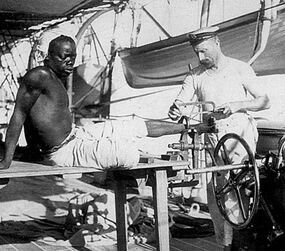
Last Slave Ship from Cape Coast Castle
While there is no officially documented account identifying a specific "last ship" that departed from Cape Coast Castle with enslaved Africans onboard, an examination of British records suggests some key insights into the timeline of events:
✅ The last known British slave ship voyage that is connected to Cape Coast Castle is believed to have taken place between the years 1806 and early 1808. This time-frame coincides closely with the implementation of the 1807 Act, which was a pivotal piece of legislation in British history aimed at abolishing the slave trade. This means the voyage may have occurred just before this significant law came into effect or immediately afterward.
Following the enactment of the abolition, the role of Cape Coast Castle transitioned dramatically. The castle's primary purpose shifted toward more administrative, military, and missionary endeavors under the authority of the British Crown, moving away from its previous function as a central hub for the transatlantic slave trade.
**Important to Note:**
It is crucial to remember that although the slave trade itself was officially abolished with the passing of the 1807 Act, slavery as an institution was not completely eradicated in British territories until 1833. This distinction highlights the ongoing challenges faced in the fight for freedom and equality.
Moreover, despite the abolition of the legal slave trade, smuggling and illegal shipments of enslaved individuals persisted along the coast. However, after 1807, Cape Coast Castle, due to its status under British control and the heightened scrutiny following the abolition, became less involved in these illicit activities.
In conclusion, the last slave trading vessel to legally depart from Cape Coast Castle is thought to have sailed around the years 1807 to 1808, aligning with the timeline of the British Abolition of the Slave Trade Act. This period marks a significant historical moment not only for Cape Coast Castle but also for the broader narrative of the struggle against slavery and the quest for human rights.
While there is no officially documented account identifying a specific "last ship" that departed from Cape Coast Castle with enslaved Africans onboard, an examination of British records suggests some key insights into the timeline of events:
✅ The last known British slave ship voyage that is connected to Cape Coast Castle is believed to have taken place between the years 1806 and early 1808. This time-frame coincides closely with the implementation of the 1807 Act, which was a pivotal piece of legislation in British history aimed at abolishing the slave trade. This means the voyage may have occurred just before this significant law came into effect or immediately afterward.
Following the enactment of the abolition, the role of Cape Coast Castle transitioned dramatically. The castle's primary purpose shifted toward more administrative, military, and missionary endeavors under the authority of the British Crown, moving away from its previous function as a central hub for the transatlantic slave trade.
**Important to Note:**
It is crucial to remember that although the slave trade itself was officially abolished with the passing of the 1807 Act, slavery as an institution was not completely eradicated in British territories until 1833. This distinction highlights the ongoing challenges faced in the fight for freedom and equality.
Moreover, despite the abolition of the legal slave trade, smuggling and illegal shipments of enslaved individuals persisted along the coast. However, after 1807, Cape Coast Castle, due to its status under British control and the heightened scrutiny following the abolition, became less involved in these illicit activities.
In conclusion, the last slave trading vessel to legally depart from Cape Coast Castle is thought to have sailed around the years 1807 to 1808, aligning with the timeline of the British Abolition of the Slave Trade Act. This period marks a significant historical moment not only for Cape Coast Castle but also for the broader narrative of the struggle against slavery and the quest for human rights.